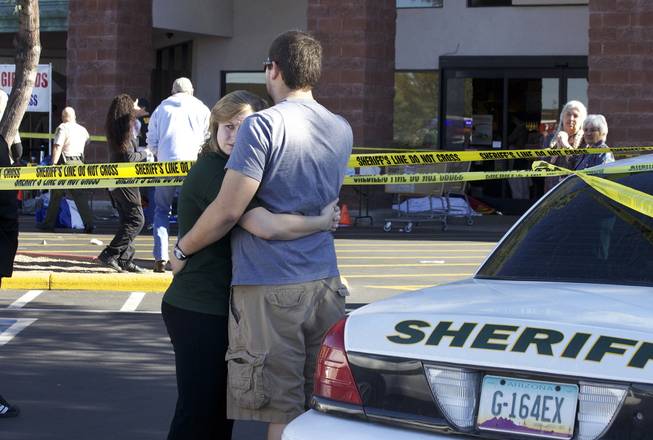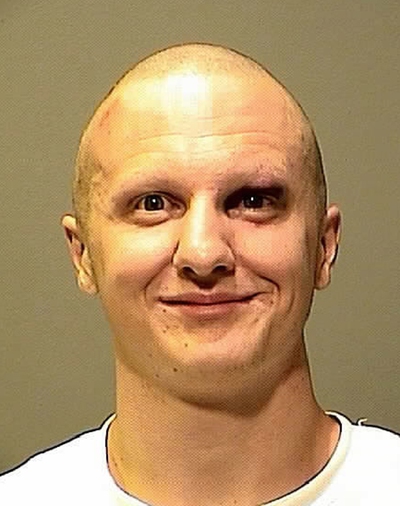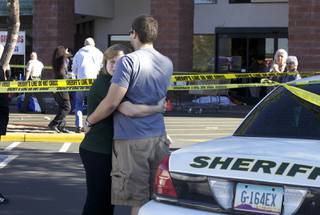
James Palka / AP
Two people embrace each other at the scene where Rep. Gabrielle Giffords, D-Ariz., and others were shot outside a Safeway grocery store in Tucson, Ariz. on Saturday, Jan. 8, 2011.
Sunday, Jan. 16, 2011 | 2 a.m.
View more of the Sun's opinion section
Sun archives
- Tucson attack motivation for Berkley’s town hall event (1-15-2011)
- Some members of Congress amp up security after attack (1-13-2011)
- Shooting suspect fell through mental health cracks (1-12-2011)
- Congresswomen describe seeing Giffords open eye (1-12-2011)
- Gun control, tone of rhetoric take center stage after Arizona shooting (1-11-2011)
- Suspect in Arizona shooting held without bail, photo released (1-10-11)
- Tucson shooting alters congressional agenda (1-10-2011)
- Tragedy brings together lawmakers on both sides of aisle (1-9-2011)
- Congresswoman shot, federal judge among 6 killed in Arizona rampage (1-8-2011)
- Group to discuss possible changes to concealed carry permits (9-29-2010)
- Budget cuts threaten construction of children’s psychiatric hospital (8-28-2010)
- Nevadans are free to don their arms in the open (4-7-2010)
- Ensign wants price on D.C. voting right: Loosened gun law (3-10-2009)
- Nevada ACLU supports an individual’s right to bear arms (7-11-2008)
In the wake of last weekend’s attack on Arizona Rep. Gabrielle Giffords, which killed six and injured 14, including Giffords, lawmakers are discussing numerous ways to ensure an incident like that doesn’t happen again.
Some ideas have been written off as either political ploys to fix some of the blame on enemies or legislative long shots. But at least one idea — improving the nation’s mental health system — appears likely to gain some traction.
One proposal has been to raise the rhetoric. Lawmakers — mostly Democrats — have pointed an accusing finger at Sarah Palin and Sharron Angle, who spent the 2010 election cycle deploying gun-toting imagery and catchphrases. Although increased civility would surely be a good thing, Jan. 8’s attack wasn’t the work of a Tea Party militia carrying out a political fatwa.
Improving security is another idea. But that too presents problems: Police are a deterrent to crime, yet in the case of a determined assailant in an open setting, armed bodyguards add not only to the cost, but also to the potential for crossfire.
That leaves two areas for lawmakers to focus: the man — in particular his mental health — and his gun.
In response to the Giffords shooting, lawmakers — particularly those from New York — have been rolling out gun control proposals: from Democrat Carolyn McCarthy’s offer to ban semi-automatics to Republican Peter King’s suggestion that firearms be banned within 1,000 feet of a member of Congress.
Gun control is a long shot in a Republican-led House of Representatives, said Rep. Robert Andrews of New Jersey, but “I think we have to try.”
Regardless of the party in charge, Congress has not passed legislation placing any nationwide restriction on firearms since the assault weapons ban of 1994. That law expired in 2004.
Similarly, Congress hasn’t passed federal legislation concerning the diagnosis or treatment of mental health disorders since the early 1990s. It has been left to the states to design rules.
In Arizona, the standards for obtaining guns and accessing mental health treatment are fairly liberal. When it comes to guns, Arizona has some of the lightest regulations in the country. There is no requirement for a permit or any waiting period past the time it takes a licensed dealer to run a cursory federal background check. Since July, it’s also legal for anyone over the age of 21 to carry a concealed weapon without a permit.
In fact, the only places where it’s not legal to carry a gun in Arizona are power plants, jails, elementary and secondary schools, bars, secured areas of airports, and polling places on Election Day.
The list isn’t much more restrictive in Nevada, the only difference being that permits are required for concealed weapons.
Those laws are in sharp contrast to states such as California and Massachusetts, where all firearms require permits, registry, and are only recognized if they were issued by licensed in-state institutions. But even in the face of tragedies, regulations in places such as Nevada and Arizona aren’t likely to change because it runs counter to the state’s culture and political currents.
“There will be knee-jerk reactions from lawmakers in Washington to make gun laws more oppressive,” Nevada Republican Sen. John Ensign wrote in a short opinion column in The Washington Post. “Let me be very clear: Gun laws were not the reason that a socially isolated individual, an anarchist, chose to open fire on an elected official, her constituents and a federal judge. And changing the gun laws will not prevent such a tragedy in the future.”
Given that gun control is a nonstarter, some lawmakers say they should focus on an area where lawmakers of both parties, at the state and federal level, agree the country is lacking: tackling and treating mental health.
“If this person had exhibited some sign of heart disease, or Parkinson’s, no one would have felt any compunction about referring that individual to get medical help,” said Rep. Jan Schakowsky, a Democrat from Illinois. “But if he had been identified as someone with a mental health condition, then he wouldn’t have been able to get a gun.”
In Arizona, reporting an individual suspected of having mental disorder to the court is a fairly straightforward process. Anyone can file a report to authorities based on signs of mental illness severe enough to warrant treatment, whether or not that illness would directly translate into violent acts.
The open-door nature of Arizona’s policy caused many to wonder why alleged gunman Jared Loughner was never reported by his teachers, students, and peers at Tucson’s Pima Community College, who said he had a long history of exhibiting what they described as disturbing and dangerous behavior.
It’s much more difficult to commit someone in Nevada. Although the standard to subject someone to a court review in Arizona is observably persistent or acute illness, it’s not possible to compel the same sort of state action in Nevada unless the subject poses an imminent danger to himself or others.
Although that standard is generous in protecting the rights of individuals not to be forcibly treated against their will, it also puts unnecessarily high stakes on receiving necessary, intercessory help, advocates say.
At the root of the problem is Nevada’s “critical shortage” of hospital beds dedicated to treat people with mental illness, according to the Treatment Advocacy Center, a national organization dedicated to highlighting the difficulties individuals with mental disorders face in getting help.
According to a 2005 study by the center, Nevada had the nation’s lowest ratio of beds dedicated to mental health patient — 5.1 per 100,000 residents. That’s only slightly worse than Arizona’s 5.9 beds per 100,000, but nowhere near the recommended minimum of 50 public psychiatric beds per 100,000 (a level not a single state meets, although Mississippi comes the closest, with 49.7).
State lawmakers expect the situation to grow worse as they brace for cuts to the mental health budget when Gov. Brian Sandoval releases his proposals to trim billion of dollars from the books next week.
Some lawmakers want to see the federal government step in.
At a meeting in her district office to honor Giffords on Friday, Rep. Shelley Berkley said increased mental health funding at the federal level might be the solution.




Join the Discussion:
Check this out for a full explanation of our conversion to the LiveFyre commenting system and instructions on how to sign up for an account.
Full comments policy